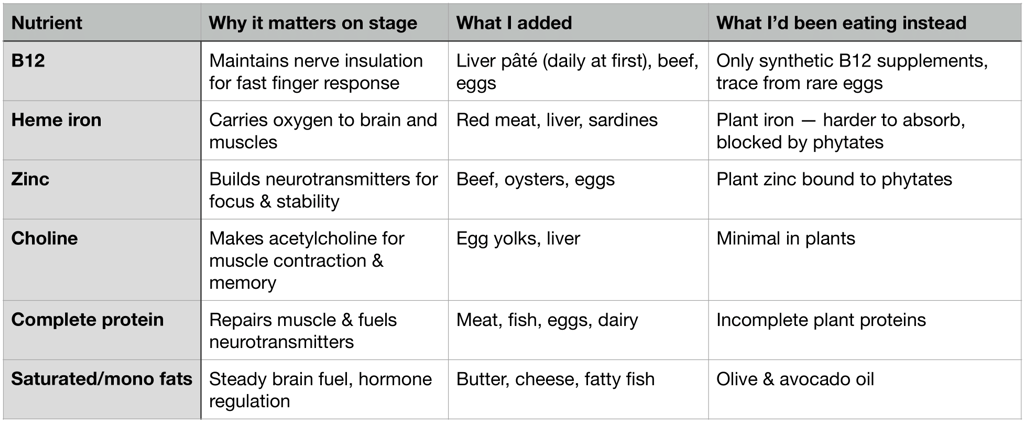You’re Ready to Play — But Your Brain and Fingers Won’t Cooperate
You’ve done the work. Hours of slow practice, careful run-throughs, every phrase rehearsed until it feels second nature. Then comes the performance — and instead of the music flowing, your own body turns into the biggest obstacle... That's why I've started looking at what was on my plate
NUTRITION
Naama Neuman
8/14/20256 min read


You’ve done the work. Hours of slow practice, careful run-throughs, every phrase rehearsed until it feels second nature.
Then comes the performance — and instead of the music flowing, your own body turns into the biggest obstacle. Your hands tremble. Your breath feels tight. Your brain lags, like you’re moving through water. You push harder, trying to will yourself into control, but every note feels heavier than it should.
When the last sound fades, you’re left staring at the floor, wondering: How can I trust my playing if I can’t trust my body and mind?
For me, these moments stopped being rare mistakes. They became my normal. The music itself was no longer my focus — I was managing a crisis in real time. My mouth went dry, my chest tightened, my fingers felt like they belonged to someone else. All my energy went into holding things together just enough to get through.
And like most musicians, I blamed my mind. I thought I needed more discipline, more mental control, another layer of performance psychology. I spent years (and a lot of money) on coaches, breathing techniques, and “mental skills” training. They helped a little — but never enough to stop the slow decline.
The Turning Point
Meanwhile, my “performance diet” looked exactly like what we’re told will give us energy and focus: oatmeal with soy milk, berries, nuts, fresh fruit for breakfast. Quinoa, tofu, big salads, cooked vegetables. Curries with coconut milk and rice. Bread only occasionally. Lean chicken or salmon here and there, an egg every few days. And supplements — B12, vitamin D3 + K2, vitamin C, fish oil, chlorophyll, curcumin — as if I could cover any gap with a capsule.
From the outside, it looked perfect. From the inside, my ability to think and play clearly under pressure was slipping away. If you’d told me then that breakfast could have anything to do with my fingers missing a note, I would have smiled politely and gone back to the practice room.
It wasn’t until I accidentally transitioned into a ketogenic diet — without aiming to — that I began to notice something strange: the tremors, the fog, the constant fight on stage… they were fading. That’s when the harder question hit me: What if the problem had never been my mind at all… but what I was eating to fuel it?
Why It Was Happening
On stage, the pressure you feel isn’t just “nerves” — it’s your whole body shifting into stress mode. Hormones like cortisol and adrenaline surge, telling your brain and muscles to get ready for action. That means they suddenly need more fuel, and if your body’s been running on quick-burning carbs, it’s like trying to play a long, delicate passage on a wind instrument with a slow air leak in the keys — you’ll run out of control before the phrase is over.
But it wasn’t just running out of fuel. I was running low on the raw materials my brain and body need to work at their best — the fats, complete proteins, vitamins, and minerals that build and repair cells. Without them, even my “good practice days” felt harder than they should. As Dr. Georgia Ede puts it: “The brain is made of fat and protein — if you don’t eat enough of them, you can’t expect it to work properly.”
The final piece was one I couldn’t feel right away: chronic inflammation. This is when your body’s repair systems stay switched on all the time, often triggered by certain foods. It sounds harmless, but it’s like playing a violin with a slightly warped bridge — you can still make music, but every note costs more effort, and your tone and response will suffer. Performance stress didn’t cause my problem; it just made it impossible to hide.
What My Brain and Body Actually Needed
When I first added back red meat, I didn’t realize I was also restoring nutrients my body had been short on for years.
I’d been eating foods that looked healthy — oatmeal, salads, quinoa, tofu, fruit — but they weren’t giving me what human brains and muscles actually run on. I even took B12 supplements, not knowing that the form in food — especially liver and red meat — comes packaged with cofactors that make it absorbable and usable.
For cooking, I used olive oil and avocado oil — both marketed as healthy, but neither supplying the stable, saturated fats that are essential nutrients for human brains and bodies.
Some nutrients were missing entirely; others were present in forms my body couldn’t use well because of anti-nutrients in plants.
How I Changed My Diet — and My Playing
After 17 years without red meat, my first serving felt strange. My digestion took a couple of weeks to adjust — occasional loose stools, no pain — then my body began asking for more.
I made changes one meal at a time:
Breakfast — Swapped oatmeal and soy milk for eggs and bacon with olives, radishes, or cucumber. The B12, choline, and steady fat kept my hands calm and my head clear all morning. Sometimes I added a handful of berries blended into unsweetened coconut yogurt — variety without the carb crash.
Lunch — Started with fish in olive oil and a small portion of sweet potato. The fish gave me complete protein, omega-3s, and heme iron — but the sweet potato made me drowsy and unfocused. I swapped it for sauerkraut, which paired perfectly with fish or the liver pâté I began eating almost daily. The pâté was packed with B12, iron, and choline I’d been missing.
Dinner — One lamb chop became 500g of steak with cooked vegetables. I stayed at that amount for six months before my appetite naturally reduced. Restoring iron, zinc, and complete protein rebuilt my stamina so rehearsals and concerts no longer relied on sheer willpower.
Within weeks, my energy was steady from morning to night. Anxiety I’d lived with since my teens disappeared. Three months in, a colonoscopy confirmed my ulcerative colitis was in full remission. The constant background tension in my body was gone, and my connection to my instrument felt solid again.
Myths I Had to Unlearn — And How My Results Proved Them Wrong
Myth 1: A banana before playing will steady your nerves.
Yes, it has potassium — but also ~12g sugar, much of it as fructose, which doesn’t trigger fullness signals. The quick spike and drop left me hungrier and less focused.
Instead: Choose steady fuel — protein and fat — before you play.
Myth 2: Plant protein can match animal protein.
Combining grains and legumes still gives you low-amount, low-quality protein that’s harder to absorb. Beef gave me mental clarity and steadiness no plant combo had matched.
Instead: Base meals on complete, bioavailable protein.
Myth 3: Glucose is the body’s preferred fuel.
Glucose burns first, but so does alcohol — and we don’t call alcohol “preferred” fuel. The brain runs cleaner on ketones.
Instead: Train your body to use fat for steady energy.
Myth 4: Pain and tendonitis are just part of being a musician.
Mine vanished within weeks of changing my diet. They were signs of inflammation, not destiny.
Instead: Reduce inflammatory foods and increase nutrient density.
Myth 5: A plant-rich diet is best for your brain.
Without enough animal fats and complete protein, recovery and precision suffer.
Instead: Prioritize nutrient-dense animal foods alongside low-toxin plants if desired.
Myth 6: Eating plants is more ethical than eating animals.
Monocrop agriculture kills vast numbers of animals and destroys habitats. Regenerative farming with animals sustains soil and requires far fewer total deaths.
Instead: Learn the full impact of your food choices.
The Payoff
Now, when I step on stage — whether it’s an audition, a concert, or a competition — I’m no longer pushing through that thick, unseen barrier that made every movement and thought feel like it was dragging through water. Back then, even when I managed to get the notes out, it took everything I had — and I’d still walk off stage drained and frustrated.
The dips, tremors, and mental fog I once fought through simply aren’t there anymore.
It’s not about chasing perfection. It’s about giving your body both the energy and the building blocks it needs to stay strong, repair itself, and fire on all cylinders — so all those hours of training and every mental skill you’ve practiced can finally show up when it matters most, instead of being muffled by a body that’s running on the wrong fuel.
Better playing doesn’t always start in the practice room — sometimes, it starts in the kitchen.
If you’ve been doing everything “right” and still find yourself fighting foggy focus or shaky control on stage, start with what’s on your plate.
My free guide, “5 Surprising Foods That Kill Performance Energy,” shows the exact foods that were quietly working against me — and what I replaced them with so my brain and fingers could work in sync again.


